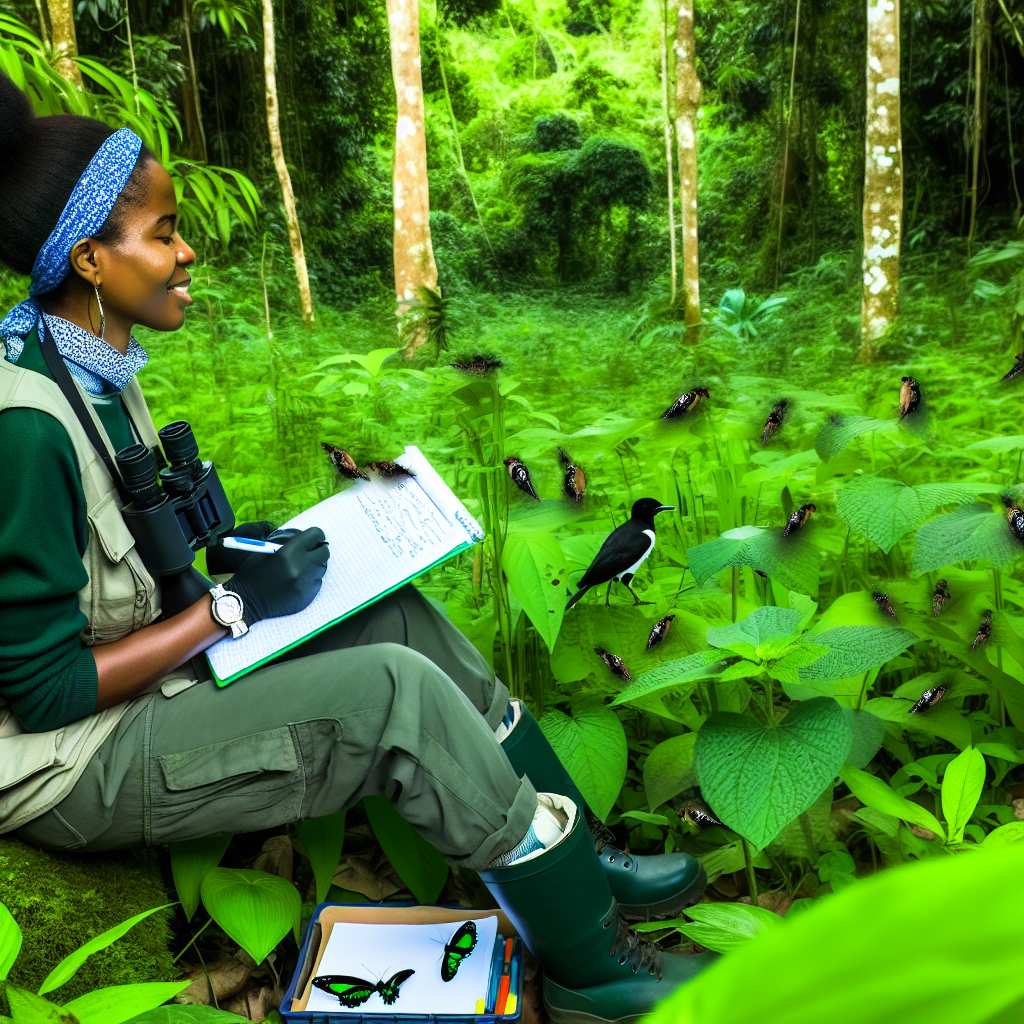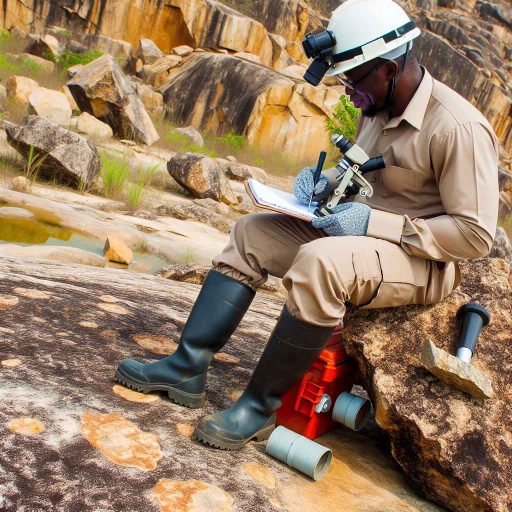Introduction
Biodiversity refers to the variety of life on Earth, including species, ecosystems, and genetic diversity.
It is crucial for maintaining ecological balance and supporting human well-being.
Nigeria is home to a rich tapestry of ecosystems, ranging from the lush rainforests of the south to the arid savannas of the north.
This diversity supports a wide array of wildlife, from elephants and lions to a plethora of bird species.
The purpose of this blog post is to explore Nigeria’s biodiversity from an ecological perspective, highlighting the unique ecosystems and species found in the country.
By understanding and appreciating Nigeria’s natural heritage, we can work towards its conservation and sustainable management for future generations.
Overview of Nigeria’s Biodiversity
Nigeria, located in West Africa, has a diverse range of ecosystems due to its unique geographical position.
- Impacts of Nigeria’s geographical location on biodiversity:
- Nigeria’s location near the equator provides a tropical climate, ideal for diverse plant and animal species to thrive.
- The country’s varied topography, from rainforests in the south to savannas in the north, contributes to diverse habitats.
- Statistics on Nigeria’s biodiversity:
- Nigeria is home to over 4,700 species of plants, 940 species of birds, 280 species of mammals, and countless other species of insects, reptiles, and amphibians.
- There are a wide variety of ecosystems in Nigeria, including rainforests, mangroves, savannas, and freshwater habitats like rivers and lakes.
- Significance of Nigeria’s biodiversity:
- Nigeria’s biodiversity is not only ecologically important but also culturally significant, as many indigenous communities rely on the land for their livelihoods and spiritual practices.
- The country’s rich biodiversity attracts ecotourism, contributing to the local economy and raising awareness about conservation efforts.
Nigeria’s biodiversity is a treasure trove of unique flora and fauna, supported by its favorable geographical location, diverse ecosystems, and cultural significance. It is crucial to protect and preserve this natural heritage for future generations to enjoy and benefit from.
Threats to Nigeria’s Biodiversity
Human activities such as deforestation, urbanization, and pollution pose significant threats to Nigeria’s biodiversity.
These activities have direct and indirect negative impacts on the country’s ecosystems and wildlife.
Deforestation
One of the major threats to Nigeria’s biodiversity is deforestation.
The country has experienced extensive clearing of forests for agriculture, logging, and infrastructure development.
This has led to the loss of critical habitats for many plant and animal species.
Deforestation also disrupts ecological processes, such as nutrient cycling and water regulation, which are essential for maintaining the balance in ecosystems.
As a result, many species are at risk of extinction due to habitat loss.
Urbanization
The rapid urbanization in Nigeria is another threat to biodiversity.
As cities expand, natural habitats are converted into residential and commercial areas, leading to the fragmentation of ecosystems.
This fragmentation isolates species populations and disrupts their movement and gene flow.
Urban areas also contribute to pollution and waste generation, which further degrade the environment and harm wildlife.
Noise pollution, light pollution, and chemical contamination are some of the negative impacts of urbanization on biodiversity.
Pollution
Pollution from various sources, such as industrial activities, agriculture, and waste disposal, poses a significant threat to Nigeria’s biodiversity.
Water pollution, air pollution, and soil contamination can have detrimental effects on plants, animals, and ecosystems.
Contaminants in the environment can accumulate in the food chain, leading to bioaccumulation and biomagnification of toxic substances in wildlife.
This can result in health problems, population decline, and even extinction of species in the long run.
Climate Change and Habitat Loss
Climate change is a global phenomenon that is affecting Nigeria’s ecosystems and biodiversity.
Changes in temperature, rainfall patterns, and extreme weather events have direct impacts on wildlife populations and habitats.
Rising temperatures and prolonged droughts can lead to habitat loss, reduced food availability, and increased competition among species.
Some species may be unable to adapt to these changes, leading to declines in population sizes and local extinctions.
Endangered Species and Conservation Status
Nigeria is home to several endangered species that are at risk of extinction due to human activities and environmental pressures.
Some of the endangered species in Nigeria include the Nigerian chimpanzee, the African elephant, the African manatee, and the Cross River gorilla.
These species are classified as critically endangered, endangered, or vulnerable according to the IUCN Red List.
Conservation efforts are crucial to protect these species and their habitats, including the establishment of protected areas, research and monitoring programs, and community-based conservation initiatives.
It is essential to raise awareness, implement sustainable practices, and prioritize conservation efforts to safeguard the country’s rich and diverse ecosystems for future generations.
Delve into the Subject: Geology Internships and Industrial Training in Nigeria
Government Policies and Initiatives
Nigeria has made significant efforts to protect its rich biodiversity through various government policies and initiatives.
One of the key policies is the National Biodiversity Strategy and Action Plan (NBSAP), which provides a framework for conservation and sustainable use of biodiversity in the country.
The NBSAP aims to address threats to biodiversity and promote its conservation through the implementation of strategic actions.
Role of NGOs and Local Communities
Non-governmental organizations (NGOs) and local communities play a crucial role in biodiversity conservation efforts in Nigeria.
These organizations work closely with government agencies, research institutions, and community stakeholders to implement conservation projects and raise awareness about the importance of protecting biodiversity.
One prominent NGO is the Nigerian Conservation Foundation (NCF), which has been instrumental in conservation initiatives across the country.
Transform Your Career with Expert Guidance
Get personalized mentorship consulting that’s tailored to your unique path. Our expert advice is actionable and exclusive.
Get StartedSuccessful Examples of Conservation
- Yankari Game Reserve: Located in Bauchi State, Yankari Game Reserve is one of Nigeria’s most famous wildlife parks. The reserve is home to a diverse range of plant and animal species, including elephants, lions, and hippos. Conservation efforts at Yankari have focused on habitat protection, anti-poaching measures, and community involvement in conservation activities.
- Cross River National Park: This national park is situated in Cross River State and is renowned for its biodiversity, including endangered species such as the Cross River gorilla and the Nigeria-Cameroon chimpanzee. Conservation efforts in the park have included habitat restoration, wildlife monitoring, and community-based conservation initiatives.
- Omo Forest Reserve: Located in Ogun State, Omo Forest Reserve is a vital biodiversity hotspot in Nigeria. The reserve is home to unique plant and animal species, including the endangered white-throated guenon monkey. Conservation projects in Omo Forest Reserve have focused on reforestation, habitat protection, and environmental education for local communities.
Discover More: Bioinformatics Job Market Trends in Nigeria
Importance of Biodiversity Conservation
Preserving Nigeria’s biodiversity is crucial for ecosystem services such as clean air and water.
Conservation also benefits the economy by supporting industries like agriculture, tourism, and pharmaceuticals.
Additionally, biodiversity conservation is linked to human well-being, as it provides food, medicine, and recreational opportunities.
Interconnectedness of Biodiversity Conservation with Sustainable Development
- Biodiversity conservation plays a vital role in achieving sustainable development goals by ensuring the long-term health of ecosystems.
- Preserving natural habitats and species diversity is essential for maintaining ecological balance and resilience to environmental changes.
- Healthy ecosystems contribute to climate regulation, soil fertility, and pest control, which are essential for sustainable agriculture and food security.
Need for a Multi-Stakeholder Approach in Biodiversity Conservation Efforts
- Collaboration between government agencies, non-governmental organizations, local communities, and private sectors is essential for effective biodiversity conservation.
- Engagement of diverse stakeholders ensures a comprehensive understanding of the value of biodiversity and facilitates the implementation of conservation strategies.
- Partnerships between stakeholders help in mobilizing resources, sharing knowledge, and promoting sustainable practices for biodiversity conservation.
Find Out More: Government Policies on Math Education in Nigeria

Recommendations for Biodiversity Conservation
Encourage reforestation efforts by participating in tree planting campaigns or supporting organizations dedicated to preserving forests.
Reduce the use of single-use plastics to prevent pollution of land and water bodies, which can harm biodiversity.
Support sustainable agriculture practices that don’t rely on harmful pesticides and chemicals, which can negatively impact ecosystems.
Advocate for the establishment of protected areas and wildlife reserves to safeguard important habitats and species.
Call for stronger legislation to regulate activities that threaten biodiversity, such as logging, mining, and poaching.
Increase funding for conservation projects and initiatives that aim to protect endangered species and ecosystems.
Promote eco-tourism as a way to generate income for local communities and raise awareness about the value of biodiversity.
Educate the public about the importance of biodiversity through school programs, workshops, and awareness campaigns.
Collaborate with local communities to involve them in conservation efforts and empower them to take ownership of their natural resources.
Engage with policymakers to advocate for the integration of biodiversity conservation into national development plans and policies.
Strengthen enforcement mechanisms to ensure that laws protecting biodiversity are effectively implemented and enforced.
Foster partnerships between government agencies, NGOs, academia, and local communities to coordinate conservation efforts and share resources.
By implementing these recommendations, individuals can play an active role in biodiversity conservation.
Policymakers can work towards creating a more sustainable future for Nigeria’s rich ecosystems.
Remember, every action counts in safeguarding the biodiversity that is essential for our planet’s health and prosperity.
Uncover the Details: Funding and Scholarships for Applied Botany in Nigeria
Preserving Nigeria’s Biodiversity
Preservation of Nigeria’s biodiversity is crucial for future generations.
We must take collective action to conserve and protect Nigeria’s ecosystems.
From the lush rainforests to the diverse wildlife, Nigeria’s biodiversity is precious.
Let’s work together to ensure the sustainability of Nigeria’s natural heritage.
By protecting our ecosystems, we can safeguard the future of Nigeria.
Additional Resources
Stakeholder preferences for pangolin conservation interventions in …
Environmental Impacts of Oil Exploration and Exploitation in the …




